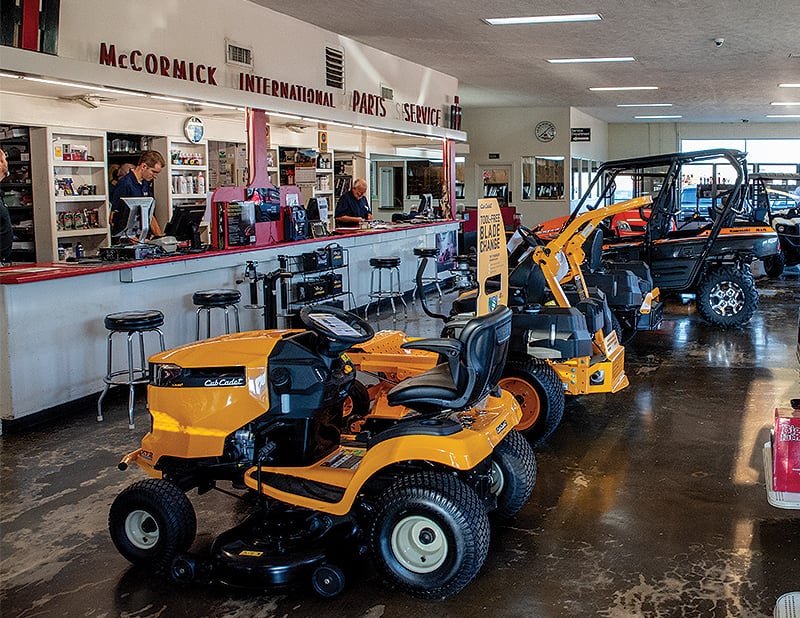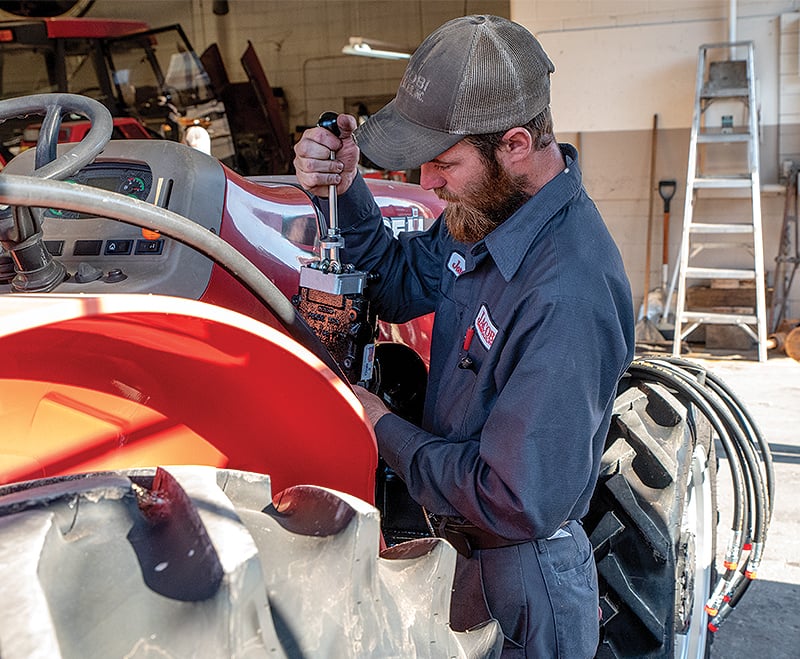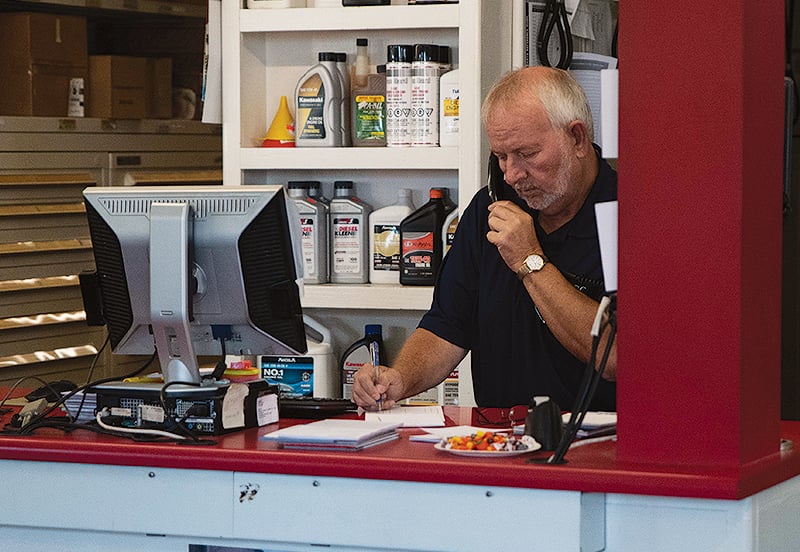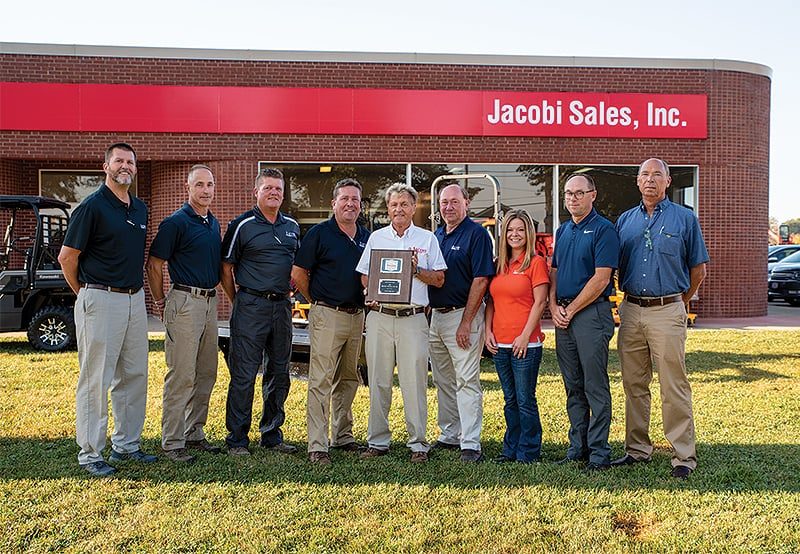Watch every transaction. Adapt to a changing market. Grow employees from within. Standardize processes. Prepare for ownership and succession. These are some of the business tenets that have helped Jacobi Sales Inc. succeed over its 91 years in business. Those best practices along with a stellar business performance helped Jacobi Sales earn 2019 Rural Lifestyle Dealer Dealership of the Year status in the multi-store category.
The dealership began in 1928 as a partnership between Will Jacobi and his son, Henry. They opened their International Harvester dealership in a converted service station in Palmyra, Ind. Earl Book joined as a partner in 1947 and the two families have grown the business together since then. The dealership now has 7 locations, all within a 90-mile radius of Louisville, Ky. The fifth generation is now part of the operation.
“That’s an accomplishment you don’t see very often. Our customers like the longevity of the people they work with. We’re here for them. Word-of-mouth is our best advertisement — and it gives us quality customers. It’s actually been a fun business,” says Phillip Jacobi, son of Henry, who is chairman of the board.
The dealership’s lines today include Kubota, Case IH, Cub Cadet, Kawasaki, Woods Equipment and Land Pride. Kevin Book, son of Earl Book and vice president and general manager, says, “The one criteria we like is they are all investing in product development. They are expanding their product lines, which gives us added opportunity and they put a high emphasis on customer satisfaction.”
Jacobi Sales Inc.
Founded: 1928
Locations: Palmyra, Sellersburg, Seymour and Franklin, Ind., and Elizabethtown, Shelbyville and Louisville, Ky.
Mainlines: Case IH and Kubota (earned Kubota Elite Dealer status in 2018)
Shortlines: Cub Cadet, Kawasaki, Land Pride and Woods Equipment
Employees: 120
2018 Revenues: $67.3 million (wholegoods, $50 million; parts, $11.6 million; service, $5.2 million; other, $500,000)
2018 Absorption Rate is in the 70s
2018 Return on Assets: 74%
Dealership Management System: DIS
Website & Digital Marketing Vendor: ARI Network Services
The panel of judges that selected Jacobi Sales commented, “Jacobi Sales has experienced the growth of farm equipment to the production farmers and then the change to rural lifestylers in recent years. They represent a resiliency necessary to change with the changing markets they serve.”
Achieving Excellence
A breakdown of the dealership’s financial performance underscores the level of excellence it is achieving. For 2018, its return on assets was 7.4% and revenue earned per employee was more than $560,000. Its revenue numbers actually declined by nearly $7 million from 2015-2017, although profits increased. Revenues picked back up last year, increasing by $4 million from 2017. Seventy-seven percent of its wholegoods sales were for non-agriculture equipment.
Book explains its performance, “This trend supports the change in our customer base that’s been happening over the last 20 years. We are changing from an ag base to a sundowner/consumer/light construction base at the majority of our dealerships. We’ve worked hard to accept that change and profit from it.”
Their margin goals are 20% on lawn & garden equipment; 12-13% for light construction; 10% for ag tractors and 20% on used equipment. All stores sell to all segments. However, the Sellersburg, Ind., and Louisville, Ky., locations focus mainly on light construction and rural equipment sales.
Dealer Takeaways
- Family-owned businesses need a defined structure regarding responsibilities, ownership and succession. Consider requiring family members to work in the business to be part of the ownership structure.
- Establish a workflow and use software tools to monitor performance. Monitor down to the individual transaction level.
- Find ways to “grow your own” employees, developing them to fill positions they in which they show talent.
The majority of its rural equipment is first delivered to Palmyra from manufacturers for setup. “Palmyra is centrally located and distribution has a wagon wheel type affect. We feel that having complete setup shops at each location increases your overhead and increases inventory levels,” Book says.
The dealership’s absorption percentage is in the ’70s, a number they’re working to improve. For instance, they’re eliminating most parts discounts to competing service shops; making sure freight is charged on special order parts; increasing shop rates; and promoting parts offerings at open houses and service clinics. They’re also tracking the performance of their technicians and providing a report with their paycheck stub with comments for improvement.
Monitoring Performance
The dealership knows where it stands — and where it needs to improve — because it has a clear process for monitoring its financial performance. It’s been using DIS dealership management system since 1994 and every transaction is monitored by each store manager as well as the corporate office manager. “DIS is the most important management tool we have. Not only does it show us margins and profitability, but key components include the ability to compare expenses from year to year, track trends from our brands, track customer purchases, create mailing lists, order parts and watch parts turnover and establish a list of key customers,” Book says.
Jacobi Sales Mission Statement
The purpose of our corporation is to provide increased return on investment for our stockholders, to provide financial stability and success with a feeling of security, increased self-esteem and accomplishment to each and every one of our employees. To accomplish this, we must have sustained sales growth, increased profit margins and improved cost efficiency in every department of our organization
Our customers must view us as the best in our field of farm, construction and lawn and garden equipment retailing. They must view us as having the best quality products, the best trained sales and service personnel, the best and most efficient facilities. They must view us as partners in their business, as assets in the communities we operate, and in general, as the leaders in our field. To attain our goals, we must first and foremost listen to our customers and satisfy their needs and requirements with the values and expertise they demand and deserve.
Book is responsible for reviewing many of the operational reports. Each location receives a monthly report showing their performance from the previous year. “We do comparisons on everything so we always know where we’re at,” he says.
Performance is monitored at a high level during quarterly meetings with stockholders and store managers. “The first meeting of the year is a major session to go over results, see where we under achieved and plan a course to correct in the coming year. It’s also a time to set goals. Anyone present is challenged to bring new ideas or suggestions to improve any aspect of our business,” Book says.
At follow-on quarterly meetings, the board takes a close look at performance compared to goals and to the previous year. They talk through tactics if sales need to be boosted and have found direct mail to be particularly successful.

Jacobi Sales began in 1928 and its current Palmyra, Ind., location was opened in 1950. Vintage signage above the parts counter is from the original store.
They strive for an annual growth goal of 10%. “What we want to see is steady growth in all that we’re doing. We don’t want massive growth or massive losses,” he says.
Customer surveys are also an important part of performance monitoring. “Three of our suppliers survey both new equipment deliveries and service performance. Each Monday morning these sites are monitored for new surveys returned by customers. Any issues are forwarded to the proper department head as well as the store manager so that the issue may be resolved in a timely manner. Surveys cannot be closed until the conflict is resolved,” Book says. Each fall, they also send letters to current and previous buyers, asking about service issues and offering discounts on equipment and service.
“Our customers like the longevity of the people they work with…” — Phillip Jacobi
Establishing the Structure
All 7 locations are managed by stockholders or their relation. All stockholders in the business also have to work in the business, according to the corporation, which was established in 1963. Family members are encouraged to test out other industries if they’re not sure about whether they want to work at the dealership. The board also asks tough questions to ensure the family member will be a good fit for the business. (See the sidebar, “Questions to Ask Before Hiring a Family Member.”)
Each location has a store manager, parts manager and service manager. The Seymour, Ind., location, which has a production ag focus, also has a sales manager. Otherwise, the sales manager position is held by the store manager. The store managers along with corporate managers (parts manager and office manager) report to Book.

Jacobi Sales’ mission statement includes a commitment to the self-esteem and accomplishment of each employee. Donnie Wills (below right) has worked in Jacobi Sales’ parts department for more than 30 years. Jordan Hardesty (top) is in his 5th year working in the service department.

Each location also has a person responsible for in-store promotional materials. “Our goal is to have a representative display of our products year-round. We sell 30% of our lawn and garden products in the fall,” Book says.
They expect to soon add a warranty specialist and an in-house marketing specialist. They currently work with a contractor through Cub Cadet for much of their online marketing. The dealership set up online parts sales about 4 years ago, but it has not yet had much of an impact on sales. Instead, customers mainly use it as a research tool and still prefer to come into the dealership.
Growing from Within
Book translates the dealership’s success back to the success of each employee. In fact, the dealership’s mission statement, which was developed 35 years ago, references the “increased self-esteem and accomplishment” of its employees. (See “Jacobi Sales Mission Statement” on page 24.) “We’re trying to make a better workplace for them. We want them to walk through the door and be proud of themselves and proud of the facility they’re working in,” he says.
Watch the Video Series with Jacobi Sales
Go to www.RuralLifestyleDealer.com to view a comprehensive video series with Phillip Jacobi, chairman, Brian Jacobi, president, and Kevin Book, vice president and general manager, of Jacobi Sales.
The dealership has added quality employees through programs with high schools and by promoting from within. Book says about 25% of its current Palmyra location employees started working for them through a high school internship. A good share of its sales staff started in its parts department. “We believe that anyone with the proper qualities can be trained to become a salesperson,” Book says.
“When someone starts in the parts department, they get used to working with customers and the customers really get to know them. When they transition to sales, they already have a following of customers,” Book says.
They look for these personal qualities when hiring for the sales department: pleasant and outgoing; computer oriented; not afraid to make cold calls; consistent and truthful; calm demeanor and organized.
What’s Ahead
Jacobi Sales sees continued growth in the rural equipment and the light construction market with the expanding Louisville metro area. A new location is being planned in Louisville to replace its current facility, which Book says it outgrew years ago. The Kubota line will play a key role in that expansion. “It’s their continual investment into the small tractor line and development of a light construction line that gives us the footings for continued growth,” says Book.
Questions to Ask Before Hiring a Family Member
Kevin Book, vice president and general manager for Jacobi Sales, shares how they evaluate whether a family member will make a good fit for the business.
He says, “Parents always have the dream to pass on the business. However, today’s youth live by different rules. They want to enjoy what they are doing, get paid well for it, and in many ways, don’t have the desire to stay at a job for an extended amount of time.”
He suggests asking these questions before hiring a family member:
- At an early age and especially in high school, does the child enjoy working in the business? Do you have to force them to come to work?
- Do they work well with employees?
- Do they ask questions about the business?
- Do they work with and respect customers?
- Do they respect their supervisors and not show a sense of entitlement? If a child doesn’t enjoy the business or respect the job, it won’t work.
The rental market will also be a special focus for Louisville, both for short- and long-term rentals and selling out of the rental fleet. “We’ve been able to maintain some extremely good margins. The other thing that has helped us is that our suppliers are providing financing. This gives us the opportunity to rent the equipment while we’re making payments on it,” Book says.
“Trickle down” technology from ag equipment is also expected to open up new revenue opportunities. For instance, Book is watching for when telematics, mapping and auto steer technology can be an affordable addition for compact tractors with attachments, such as sprayers. “There definitely is a revenue stream you can generate from telematics in setting up the service contracts,” Book says.
The future for Jacobi also includes more of what the dealership is known for. Brian Jaobi, president and part of the fourth generation, says, “I always preach about our service. We have to find solutions for our customers’ problems and I think we do a really good job of that.”
Philip Jacobi says, “Jacobi Sales is about the quality of our people and that we’re a family business.”






Post a comment
Report Abusive Comment